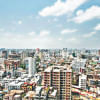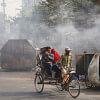Dhaka's air is now so bad it is causing cancer

Air pollution has been a major source of ill health for Dhaka's dwellers for many years, with its air ranked as one of the worst globally more times than perhaps we can count. Now a study, as per a report by this paper, has found that the concentration of carcinogenic elements such as arsenic, lead and cadmium in Dhaka's air is almost double the limit set by the World Health Organization (WHO). There are also high concentrations of cancer-causing cobalt there. This is quite frightening, to say the least.
The WHO estimates that by 2050 the number of cancer patients may more than double. Lung cancer is one of the most common forms of the disease in the country, and we can understand from the above study that Dhaka's toxic air has been a major contributing factor behind this. These carcinogenic elements come from lead-acid battery and e-waste recycling industries, coal-fired brick kilns, as well as high-emitting unfit vehicles. The blood lead levels in children particularly are very high, with around 35 million children in Bangladesh being affected. We can assume that for the children in Dhaka and other areas where industrial processes are concentrated and traffic is heavy, the health risks will be quite high.
We have seen the air quality in Dhaka and other busy hubs deteriorate in front of our own eyes. This paper, for example, has constantly reported on industries and vehicle emissions that have contributed to this disastrous situation. But what has the government done to prevent it? Why do we still see so many unfit vehicles spewing out black smoke into the faces of adults and children while they navigate the horrific traffic? Why do we still have so many brick kilns near schools and residential settlements? Why are there so many battery-operated three-wheelers everywhere, despite the obvious threats they pose?
When contacted, the concerned minister said they would look into the findings of the report. It is surprising that so little has been done in terms of enforcing environmental laws to stop the air from being so polluted in the first place. The government should realise that this is an emergency situation, and that drastic steps have to be taken to address it. This includes closing environmentally harmful brick kilns, especially those operating near residential areas and schools, managing e-waste safely, reducing the number of battery-operated three-wheelers, and properly enforcing fitness and traffic laws for all vehicles.
In a densely populated city such as Dhaka, these steps are challenging but not impossible to implement. It requires the relevant government agencies to get serious about protecting the air in the first place. With the lives of both adults and children at stake because of its toxic air, they must do everything necessary to protect them.


 For all latest news, follow The Daily Star's Google News channel.
For all latest news, follow The Daily Star's Google News channel. 











Comments